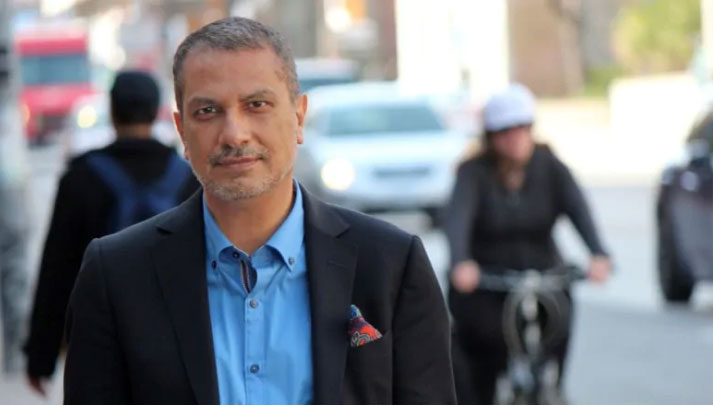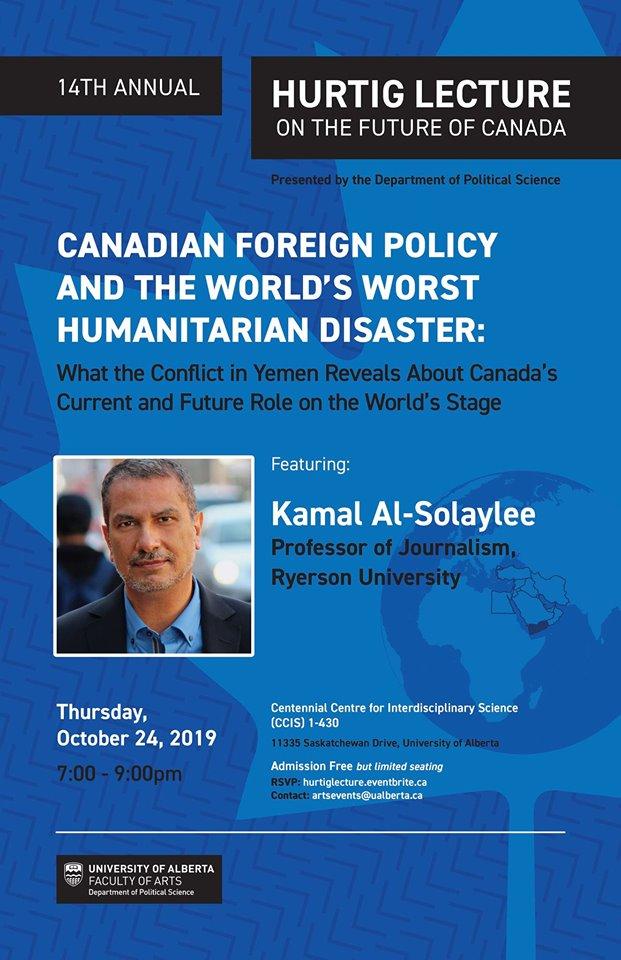For most Canadians, Yemen, one of the Arab world's poorest countries, conjures up images of civil war and strife. Few are aware that it is the home of the Mocha coffee bean, or that this country on the Gulf of Aden boasts a variety of breathtaking landscapes, includingSocotra Island, a UNESCO world natural heritage site renowned for its ancient Dr. Seuss-like trees.
"It's a true wonder of the Old World," says journalistKamal Al-Solaylee, who was born in Yemen and now makes his home in Canada. As a professor of journalism at Ryerson University and a Governor General Award nominated writer, Al-Solaylee is well-positioned to understand the complexity of the political and humanitarian crisis in Yemen - and why it should matter to Canadians.
"Canada sells arms and continues to have robust economic ties with Saudi Arabia and the United Arab Emirates, the two countries waging war on the rebels in Yemen," says Al-Solaylee, who will be speaking at the Department of Political Science's annual "Hurtig Lecture on the Future of Canada" on Thursday, October 24.
"We can't be an honest broker and a trusted ally if we also engage in acts that cause starvation, displacement and death."

Journalist Kamal Al-Solaylee will be speaking at the Department of Political Science's Hurtig Lecture on the Future of Canada (Photo: CBC)
Since 2015, the civil war in Yemen hasclaimed the lives of close to 100,000 people and put the entire country on the brink of famine and economic collapse. An estimated 60 per cent of the country's population of nearly 29 million is food insecure and do not know where their next meal might come from.
Even with his journalistic background working for newspapers like the Globe and Mail, Al-Solaylee has difficulty finding news about Yemen in Canadian media outlets, relying instead on his connections to foreign correspondents and a handful of international networks like the BBC and Al-Jazeera.
"This may explain why the average newsreader gets to hear very little about what I truly believe to be the biggest humanitarian crisis in the world right now and one of the most explosive geopolitical conflicts," he says. "Our media doesn't think that 20 million starving Yemenis is news."
Al-Solayee says that most journalists in Canada are not equipped to deal with the tectonic shifts happening around the world and even within our borders because they don't really understand their racial underpinnings or, with the ongoing instability of Postmedia - Canada's largest newspaper chain, are too busy trying to survive to look at the bigger issues.
Race is something that Al-Solaylee has addressed in his two award winning non-fiction titles, Intolerable: a Memoir of Extremes; and his most recent book,Brown: What Being Brown in the World Today Means (to Everyone).
He says that the racial issues he identified in Brown are even more extreme today.
"When I wrote Brown between 2014 and 2016, the world was in a dress rehearsal for the onslaught of populism, authoritarianism, racism, the migration crisis and many other issues that my book previewed," he says. "Since Brexit and Trump happened in 2016, the real show has begun. We've entered a new phase - and some may say simply returned to an old one - in global relations. Who could have predicted in 2014 that western democracies would be one of the most vulnerable political systems in the world or that we'll be talking about white supremacy in the White House?"
In aWalrus article from 2018, Al-Solaylee says that the situation in Yemen has been called-by the press, NGOs, and international organizations, including Amnesty International-the Forgotten War. While he does not believe that Canada will 'leap into action' any time soon, through his writing, teaching, advocacy and speaking engagements like the Hurtig Lecture, Al-Solaylee continues to raise awareness about the ongoing crisis in Yemen, and Canada's eroding identity as a peacemaker.
"We can alleviate the pain in Yemen through aid but, more importantly, by using our diplomatic strengths in the region and with European allies to bring the war to an end or to negotiate a peace settlement," he says. "It's about how we as Canadians see ourselves on the world stage."
The Department of Political Science will host journalist and academic Kamal Al-Solaylee for the 14th Annual Hurtig Lecture on the Future of Canada: "Canadian Foreign Policy and the World's Worst Humanitarian Disaster: What the Conflict in Yemen Reveals About Canada's Current and Future Role on the World's Stage.
Thursday, October 24, 7 pm - 9 pm, Centennial Centre for Interdisciplinary Science (CCIS) Room 1-430
This event is free but please register with Eventbritehere.
